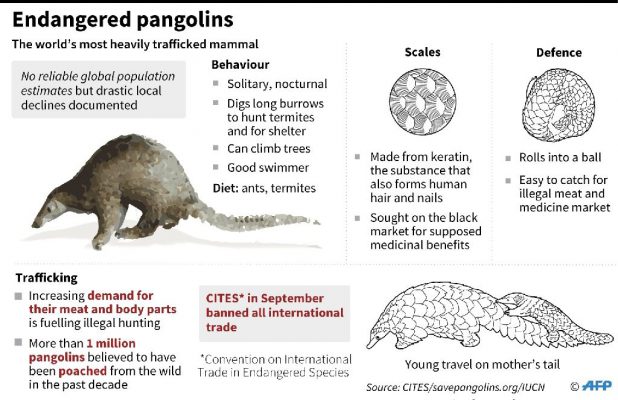- Home
- Prelims
- Mains
- Current Affairs
- Study Materials
- Test Series
Daily Current Affairs | 17th June 2020
The pangolin: can the protection upgrade by China curb its trafficking?
Recently, China accorded the pangolin the highest level of protection and removed the scales of the endangered mammal from its list of approved traditional medicines.
China’s latest decision
- A report published on June 6 in the Health Times, a Chinese state-run publication, says that the State Forestry and Grassland Administration had issued a notice on June 5 upgrading its protection of pangolins and banning all commercial trade of the endangered mammal.
- The move came about after the 2020 edition of the “Chinese Pharmacopoeia” excluded traditional medicines made from four species, and also listed alternatives sourced from species which are not endangered, reported the Health Times.
- In February 2020, when the reports linking the transmission of the virus to wet markets in Wuhan emerged, China banned the consumption of wild animals, including pangolins, in an attempt to limit the risk of diseases being transmitted to humans from animals.
Pangolin is trafficked why?

- Eight species of the scaly insectivorous creatures are distributed across Asia and Africa. They have long been hunted for their meat and scales, which indigenous tribes in central and eastern India are also known to have worn as rings. Two of these species are found in 15 states in India, although their numbers are yet to be completely documented.
- The creatures are strictly nocturnal, repelling predators by curling up into scaly spheres upon being alarmed. The same defence mechanism however, makes them slow and easy to catch once spotted.
- Their alleged health benefits in Traditional Chinese Medicine (TCM) prompted a booming illicit export of scales from Africa over the past decade.
Indian Pangolin
- India is home to two species of pangolin. While the Chinese Pangolin (Manis pentadactyla) is found in northeastern India, the Indian Pangolin is distributed in other parts of the country as well as Sri Lanka, Bangladesh and Pakistan.
- Both these species are protected and are listed under the Schedule I Part I of the Wild Life (Protection) Act, 1972 and under Appendix I of the Convention on International Trade in Endangered Species (CITES).
- IUCN status – ‘Endangered’
- Commonly known as ‘scaly anteaters’, the toothless animals are unique, a result of millions of years of evolution.
- Pangolins evolved scales as a means of protection. When threatened by big carnivores like lions or tigers they usually curl into a ball. The scales defend them against dental attacks from the predators.
Supreme Court refuses to stay the suspension of pre-natal sex selection rules, issues notice to Government
The Supreme Court has recently asked the government to explain its decision to suspend crucial rules of a parliamentary law against pre-natal sex determination and sex selection till June-end, amid the COVID-19 national lockdown.
Issue
One of the suspended provisions, Rule 8, is intrinsically connected with the statute’s provisions dealing with the mandatory registration of genetic counselling centres, laboratories and clinics. Non-compliance leads to penalty. The Central government has arbitrarily and selectively weakened a legislation aimed at curbing the pernicious activity of sex-selection and sex-determination. By suspending the Rules, the government has diluted the PCPNDT Act, the petition said.
PCPNDT Act
- The Pre-conception & Pre-natal Diagnostics Techniques (PC & PNDT) Act, 1994 was enacted in response to the decline in Sex ratio in India, which deteriorated from 972 in 1901 to 927 in 1991.
- The main purpose of enacting the act is to ban the use of sex selection techniques before or after conception and prevent the misuse of prenatal diagnostic technique for sex selective abortion.
- Offences under this act include conducting or helping in the conduct of prenatal diagnostic technique in the unregistered units, sex selection on a man or woman, conducting PND test for any purpose other than the one mentioned in the act, sale, distribution, supply, renting etc. of any ultra sound machine or any other equipment capable of detecting sex of the foetus.
Provisions of the Act

- The Act provides for the prohibition of sex selection, before or after conception.
- It regulates the use of pre-natal diagnostic techniques, like ultrasound and amniocentesis by allowing them their use only to detect few cases.
- No laboratory or centre or clinic will conduct any test including ultrasonography for the purpose of determining the sex of the foetus.
- No person, including the one who is conducting the procedure as per the law, will communicate the sex of the foetus to the pregnant woman or her relatives by words, signs or any other method.
- Any person who puts an advertisement for pre-natal and pre-conception sex determination facilities in the form of a notice, circular, label, wrapper or any document, or advertises through interior or other media in electronic or print form or engages in any visible representation made by means of hoarding, wall painting, signal, light, sound, smoke or gas, can be imprisoned for up to three years and fined Rs. 10,000.
- The Act mandates compulsory registration of all diagnostic laboratories, all genetic counselling centres, genetic laboratories, genetic clinics and ultrasound clinics.









 Latest News
Latest News
 General Studies
General Studies